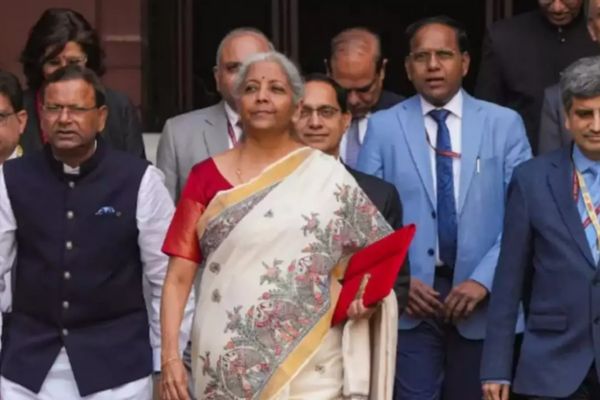The Union Budget 2025 has set the stage for transformative growth across multiple sectors, reinforcing India’s commitment to self-reliance, sustainability, and technological advancement. With a strong push for clean tech manufacturing, startup funding, and deep-tech innovation, industry leaders across domains have hailed the government’s vision. From the expansion of the Production-Linked Incentive (PLI) scheme to a ₹10,000 crore Alternative Investment Fund (AIF) for startups, the budget aims to create a self-sustaining ecosystem that fosters job creation, economic expansion, and global competitiveness. Here’s how key industry experts are reacting to the budget’s impact on renewable energy, agriculture, education, drone technology, and the startup ecosystem.
Sachidanand Upadhyay, MD, Lord’s Mark Industries Limited
“The National Manufacturing Mission announced in the Union Budget 2025 is a significant step towards bolstering India’s clean tech manufacturing ecosystem. By enhancing domestic production of EV batteries, solar PV modules, wind turbines, and grid-scale batteries, this initiative will reduce dependency on imports and strengthen India’s position in the global renewable energy supply chain. The move complements the existing PLI schemes and will encourage backward integration, enabling Indian manufacturers to scale up operations efficiently. At the Renewable Energy arm of Lord’s Mark Industries, we are committed to leveraging these policy-driven opportunities to accelerate innovation, localize clean energy solutions, and contribute to India’s transition towards a sustainable and self-reliant future. Aligning with India’s commitment to achieving net-zero emissions by 2070, Lord’s Mark Industries is contributing significantly to this vision, recently securing a project to set up 300 MW of grid-connected rooftop solar projects in Uttar Pradesh.”
Dr. Chandra Mohan Mehta, Professor and Associate Dean, School of Agriculture, LPU
“The Union Budget’s focus on agriculture as a key growth engine is a welcome move. The Developing Agri Districts Programme, along with crop diversification and enhanced irrigation, will uplift 1.7 crore farmers. Prioritizing Garib, Youth, Annadata, and Nari (GYAN) ensures inclusive growth. Strengthening energy security and export promotion will further boost rural economies. This vision aligns with India’s goal of self-reliance in agri-innovation and sustainable farming.”
Dr. Aman Mittal, Vice President, LPU
“The Budget 2025 underscores the government’s commitment to skilling and education with initiatives like Centers of Excellence in AI, Atal Tinkering Labs, and expanded infrastructure in IITs. These steps will bridge the skill gap, empower students with future-ready capabilities, and enhance India’s global competitiveness. At LPU, we welcome these reforms and remain committed to equipping students with industry-relevant skills that drive innovation and economic growth.”
Arpan Ghosh, Founder & Director, Gamma Rotors
“India’s manufacturing landscape is set for a profound transformation under the National Manufacturing Mission, which aims to deliver robust policy support, clear execution strategies, and effective governance frameworks. This initiative is poised to build a self-sustaining ecosystem that accelerates innovation, benefiting sectors such as drone technology and empowering the startup community.
A standout feature is the remarkable 89% boost in the Production-Linked Incentive (PLI) scheme allocation, which has risen to Rs 16,092 crore for FY25 from Rs 8,520 crore in FY24. This significant increase underscores the government’s strong dedication to bolstering domestic manufacturing. Importantly, 38% of this allocation targets large-scale electronics manufacturing—a critical driver for the drone industry, facilitating the development of cutting-edge, energy-efficient drone systems.
Furthermore, these measures are designed to nurture startups through access to specialized deep-tech funds, improved collaborative opportunities via the National Centres of Excellence for skilling, and streamlined regulatory frameworks. Enhanced support from the PLI scheme will further drive innovation in key drone applications, including surveillance, ARCWS, and payload delivery drones.
Overall, these initiatives are anticipated to create millions of new jobs across industries, with the drone sector alone expected to generate over 1 million jobs by 2025, solidifying India’s leadership in advanced manufacturing technology.”
Rajat Grover, Founder & CEO, Elite Marque, an integrated communications firm for Startups
“This budget’s allocation of Rs 95,000 plus crore for startups, with Rs 10,000 crore dedicated to Alternative Investment Funds (AIFs), is a masterstroke that goes beyond funding. It’s about building an innovation led economy. As someone who has seen India’s entrepreneurial journey evolve, I can say this is the kind of bold move we’ve needed for decades. Startups today contribute 4 to 5% to India’s GDP and employ over 5 million people, yet they’ve been starved of capital, especially in early stages. In 2023, funding dropped by 72% to $10 billion, leaving many promising ventures stranded. This initiative bridges that gap, but more importantly, it creates a multiplier effect. Every rupee invested in startups generates 2.5 times more jobs than traditional sectors, and this could catalyze the creation of 10 million new jobs by 2030.
What excites me most is the focus on sectors like renewable energy, healthcare, and deep tech, areas where India has the potential to lead globally. Imagine a startup in a small town developing affordable healthcare solutions or a cleantech venture scaling innovations to help India meet its 2070 net zero target. These aren’t just businesses; they’re solutions to India’s biggest challenges.
On a macro level, this move positions India as a magnet for global capital. With venture capital inflows projected to double to $20 billion by 2026, we’re not just funding startups; we’re building an ecosystem that can rival Silicon Valley. This will create a ripple effect, boosting ancillary industries, increasing exports, and reducing our dependency on foreign technology.
In essence, this isn’t just a budget announcement; it’s a vision for India’s future, a future where innovation drives growth, jobs are created at scale, and India becomes a global leader in solving real world problems. This is the foundation of a self reliant, innovation driven India, and I couldn’t be more optimistic about what lies ahead.”
Nirav Jogani, Founder of Veloce Fintech
“The 2025-26 India budget introduces a major boost for India’s startup ecosystem, with the establishment of a new ₹10,000 crore Alternative Investment Fund (AIF) for startups. This, alongside the existing Fund of Funds (FoF) which has garnered over ₹91,000 crore in commitments, reinforces the government’s dedication to nurturing a thriving startup environment. The new AIF will provide startups with expanded financial resources, enabling them to grow, attract investments, and create jobs, making them highly appealing to investors.
Additionally, the budget includes key measures to support MSME growth, such as customized credit cards for micro-enterprises and increased investment and turnover limits. These provisions facilitate business scalability and improved access to capital, creating a more conducive environment for startups.
The budget also materially raises the tax limit for individuals, which will increase disposable income, stimulate consumption, and contribute to economic growth—opening up more opportunities for startups and MSMEs.
Moreover, the government’s focus on enhancing the ease of doing business, seen through the three-year block period for transfer pricing, the upcoming simplified income tax bill, decriminalization of certain non-compliances, and a committee aimed at simplifying non-financial regulations, shows a clear effort to reduce bureaucratic barriers and promote a business-friendly environment.
These transformative measures will help India’s MSMEs and startup ecosystem thrive, driving innovation and economic prosperity.”

















